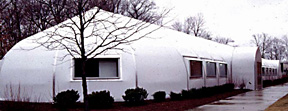Companies are turning to tents, trailers and other quick office fixes to meet demands of marketplace, Cornell study finds
By Susan S. Lang

When Monsanto needed a fast solution to building space for 40 researchers, it erected a tent. Or, more accurately, it turned to a temporary tentlike structure that took only 28 days to erect.
A year later, to Monsanto's surprise, 89 percent of employees in the tent said the building was just as attractive or better than a conventional building, and 92 percent said the interior was just as good or better.
According to a new Cornell University study, Monsanto's solution is typical of the way that leading companies are responding at a moment's notice to the demands of the marketplace. In today's competitive business environment, says the study, companies need to have not only savvy financial plans and strategies to deal with labor shortages, but also what the Cornell researchers call a diversified real estate portfolio.
Some of the portfolio's assets, the study suggests, might include tentlike office "bubbles," pre-engineered modular trailers for office space and fully outfitted rented offices. The surprising news is that employees rate these new environments highly in terms of performance, air quality and effectiveness, according to the new report "Managing Uncertainty: Integrated Portfolio Strategies for Dynamic Organizations."
Why do companies need tents and trailers? Franklin Becker, an organizational ecologist and professor of human-environment relations in the College of Human Ecology at Cornell, suggests several reasons, including "fluctuating demands for products and services, rapidly changing technology, mergers and acquisitions, changing workforce demographics and new ways of working, constantly shifting organizational strategies and fierce and unpredictable global competition."
Becker, who is director of the International Workplace Studies Program (IWSP) at Cornell, and his Cornell colleague, William Sims, have detailed the innovative strategies that leading companies from around the world are implementing -- often before they are actually needed -- as a hedge against an unpredictable marketplace. The Cornell researchers visited a number of companies and surveyed employees to determine how they rated the unusual workspaces.
They found that many of these hastily created workplaces allow companies to procure, construct and manage space with speed and imagination at a fraction of the cost and time it would take to build traditional office space. Several of these office space options are transportable.
Becker predicts that to maintain a competitive edge, more and more companies will need a to adapt quickly to new challenges and business demands with a wide range of facilities options. For example, the study notes, Intel builds "empty shells" months before the company knows how they will be used. The company, it says, uses a "cookie cutter" design, thus reducing construction time by 25 percent.
Other companies' solutions to space problems cited in the study include leasing a full-service, or turnkey, office space complete with furniture and computers; leasing another company's excess space; and modifying warehouse space for offices that can easily be modified for different kinds of workers.
The IWSP at Cornell conducts research on new ways of working, examining creative use of workplace settings, information technology, organizational culture and practices and work processes. It is supported by a consortium of private and public sector organizations in the United States, Canada, Europe and Japan, including Arthur Andersen, Citigroup, Hewlett Packard, IBM and Toyota Motor Sales.
Related World Wide Web sites: The following sites provide additional information on this news release. Some might not be part of the Cornell University community, and Cornell has no control over their content or availability.
Media Contact
Get Cornell news delivered right to your inbox.
Subscribe